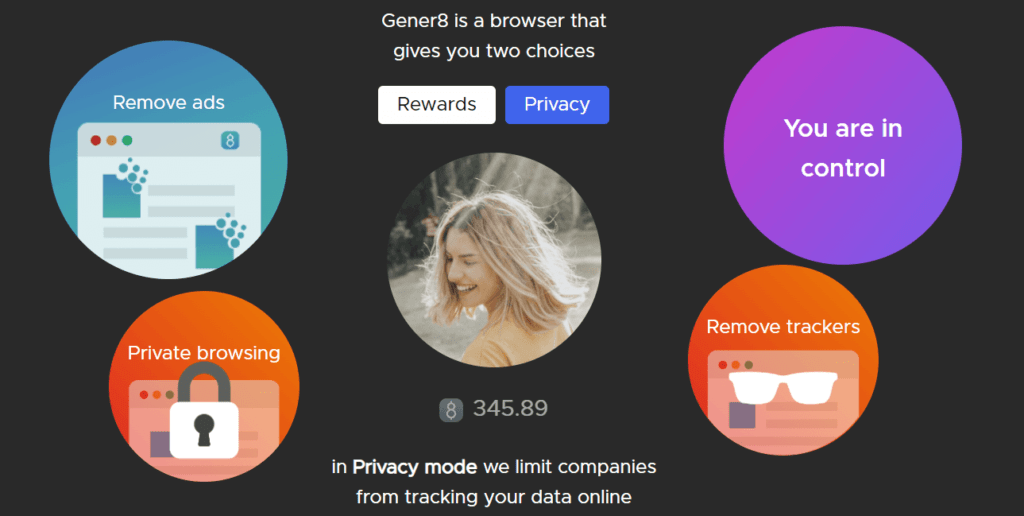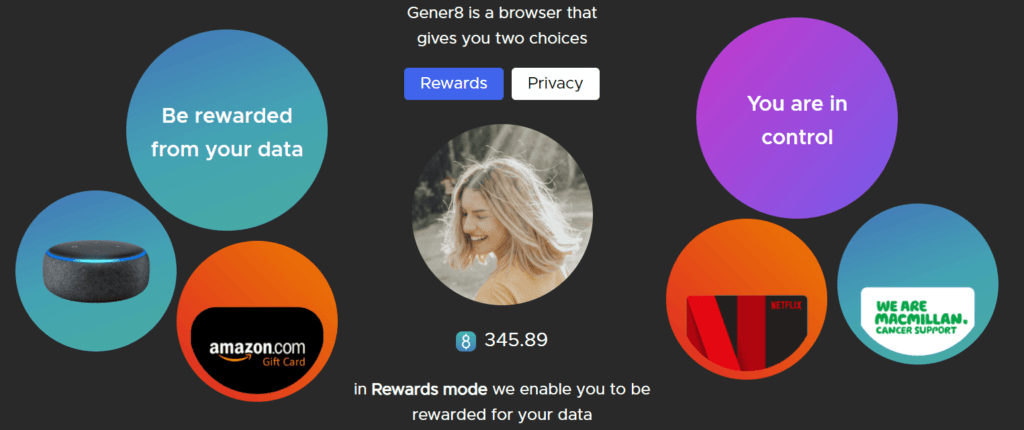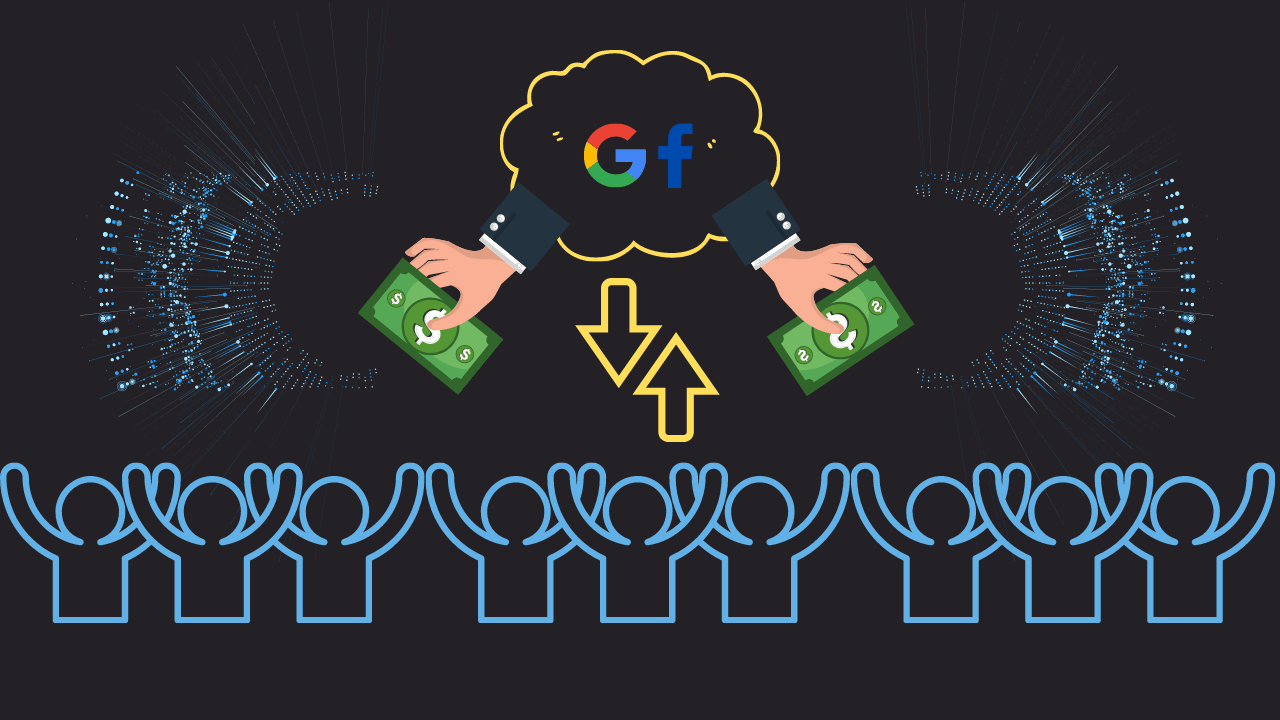Labour necessitates payment, at least in a fair world. Is this notion of fairness too utopic for the present data economy?
For companies that monopolise the data bazaar, each individual produces an endless river of data. This data is extracted or mined, and commercialised for the benefit of the companies. In essence, the production value of data is overlooked by virtue of the service offered via said company’s platforms.
In the previous story of this series, we introduced the idea of data-based financial remuneration for online users, based on the data they produce for respective platforms. At the outset, the principle of data-based payment appears cooperative and humanitarian. Take, for instance, Gener8 — a European browser that claims to fulfil all the promises of this principle. So much so, that in the process of researching for this article (and generating data) using the Gener8 browser, I was rewarded with a £32 discount on Bluetooth speakers of a leading brand, with the option to “cash-out” whenever I desired.
Surely, Gener8 is a sign that data-based remuneration is implementable? While the platform’s activities are ambitious, the available literature suggests existing policy gaps in constructing data-payment structures worldwide in a uniform manner.

The Principal Argument: Pegging a Price
To establish an impartial structure of data remuneration, the principle argument must be answered first: Can data become a commodity to buy and sell? Can we even peg a financial value to data?

Most arguments against the current data frameworks we operate within remind users that data has become ‘the new oil’, thereby becoming the world’s largest resource for incentivizing people and affirming the relevance of surveillance capitalism today. While the idea of paying people for the data they produce may seem fair on this principle, a structural overhaul of the online economic marketplace is a logistical improbability.
Tech attorney Rahul Matthan breaks down this argument by writing that data and oil — and by that extension, any resources put on the market for buying and selling — can be broadly divided into two categories: finite and infinite. Naturally occurring resources such as oil are limited, and their financial valuation in the marketplace depends on their natural availability. Depending on their availability, the market prices of oil soar and drop in the market, therefore allowing companies dealing in the industry to assert a selling price for this resource. Data, however, is unlike oil because it is numerically infinite and is limited only to the daily/weekly/yearly generation from multiple data points.
How much data can be generated from any randomly assigned user on any given day can be challenging to predict, which makes it difficult to maintain a consistent “price” for user data. Without a yardstick for valuation, companies will find it difficult to bid for data from their users at a specific price.
Existing literature suggests that data extraction may have to follow a priority-oriented model. Here is how that may look. The data extracted from a Fortune 500 business tycoon will substantially (and financially) hold much more ‘bidding value’ in the market than the data collected from retired elders. For all purposes, the personal and non-personal data accumulated from individual or multiple data points from people higher up in the economic ladder is likely to be given much more economic significance and priority than the ones ranking not-so-high on the ladder.
Eline Chivot’s article for the Centre for Data Innovation justifies this priority orientation, arguing that altogether new business models will have to be implemented if companies decide to pay users back for their data. For smaller companies that rely on the digital front, it will mean setting up paywalls for customers to access the same services that were offered for free on their website once upon a time. For monetary compensation to be more than a pipe dream, the internet world would be more likely to become a paid asset to use, which makes the entire discussion unnecessarily cyclical with no reasoned benefit in place.
Free (Market) Capitalism?
Even if an organization were to somehow figure out the logistics of pegging a value to data, find respective mediators for bidding and selling such personal and non-personal user data, and managed the paperwork required to transfer said money into the personal bank accounts of the users, the model will still be liable to another hurdle — managing revenue and other costs for sustenance.
In “How much are your online data really worth?”, Levi Schafer estimates that companies (Facebook taken in this instance) would pay users about a dozen Euros per year in such a model. As low an amount as this may be, Eline Chivot breaks this amount down further by pointing out that twelve Euros is the amount that companies can pay, if they forego all of the costs they encumber for sustenance. In essence, companies will have to pass on all of their revenue to pay users €12. If they pay users half of what they gather from profit, estimates peg that at €2 to €3 per year.
Another structure that proponents of paying-for-data suggest lies in data brokerism — otherwise known as Mediation of Individual Data — where specific data agents of the user’s choosing negotiate the terms of their data in large corporations and develop contracts for the same. Mediators of Individual Data (MIDs) have also remained the main component of Janier and Eyle’s Blueprint for a Better Digital Society model. However, this report by L’Observatoire confirms that although the value of personal data in Europe could reach up to 1 trillion Euros (8% of Europe’s GDP), it would be statistically improbable for a single individual to claim their share from this valuation. You can read more on the role that MIDs play in the paying-for-data model through our previous story.
Paid in Kind, Not in Cash
How about a use-case where users may be rewarded in kind for being active users of an organization’s platform? Take the example of fintech company CRED during the second wave of COVID-19 in India. In association with Hemkunt Foundation, Give India and Milaap, CRED paid to secure oxygen tanks and cylinders if the user donated 10,000 CRED coins. Rewards based on using an app can be seen in several other platforms such as Google Pay and PayTM; in these cases, users can avail rewards for transacting through these apps.
At a cursory view, these are not very different from the Gener8 model, which also offers users rewards for using their web browser.
Notwithstanding, this can soon become a case in reward bankruptcy. Unlike oxygen cylinders, the benefits that can be availed via Gener8 coins, or any other such like-minded application, are not consistent. While CRED is transparent about the value of their currencies (or coins), platforms like Gener8 are not.

Does more browsing equal more rewards? Are there specific things that I can search for through my personal data that are likely to yield greater rewards? Are these rewards maintained across the spectrum for every user who searches for the same thing?
Rewarding users even after the first few times they use a service requires more significant rewards to keep long-term users engaged. There is also the case of users spending hours on an internet application to garner as many rewards as possible. At the root of all of this remains the underlying question of how to make a data hierarchy for evaluating the financial value of different kinds of data.
The Indian Use-Case Looks Unlikely
Setting Europe aside, what would the scenario for data-based remuneration look like in India? How much hinges on legislation around personal data protection in India?
For all intents and purposes of establishing models of data-based remuneration in the country, several provisions of the 2019 Personal Data Protection Bill will have to be heavily altered or removed. For instance, the position of a data fiduciary as mentioned in the Bill is “an entity or individual that decides the means and purpose of processing personal data”. The data fiduciary will also hold other responsibilities, such as setting up security safeguards to prevent data misuse and grievance redressal for complaints that may arise from people.
Data fiduciaries also have the power to process data taken from individuals with their consent, which means that its roles and responsibilities would conflict directly with the proposed functions of Mediators of Individual Data. Data brokers from MIDs would have to directly connect with internet users, thereby reducing or wholly doing away with any residual responsibilities held by the data fiduciaries.
The clauses in the 2019 Personal Data Protection Bill which are concerned with the rights of individuals will be expanded upon because a pay-for-data model would mean that users directly negotiate contracts with privatised (or non-privatised) data brokers to settle payment terms. In turn, the parts of the Bill that deal with offences applicable towards data fiduciaries in terms of fraudulent or illegal activities will have to be revised to remain in tandem with the new model that would be in place. With such a system in place, companies may also vie for more and more personal data from individuals and would want to process such data outside Indian borders. However, this would conflict with the provision in the Bill that would require specific personal data to remain inside the country’s borders in the hands of the government. For the smooth functioning between the government and companies dealing in data, newer business understandings will have to be drafted to reduce any possible friction.
Soujanya Sridharan and Amrita Nanda, researchers at Bangalore-based Aapti Institute, share scepticism in mobilising such mediators of individual data in the Indian context. Over a telephonic interview with The Bastion, Sridharan and Nanda categorise the logistics of including all-encompassing data banks as “too premature”. “Putting forth such measures to what is a largely digitally uninitiated population may wrongfully incentivize individuals to release sensitive information (such as health data, passwords etc.) for greater financial benefits, casting questions on the ethical standards in digital privacy,” they worry. Fundamentally, such an approach belies the feeling that the personal data of individuals are easily commercially tradeable.
In such a context, it becomes important to offer some operational definitions of ‘justice’ or ‘fairness’ when it comes to the ethics of digital privacy, and how potential mediators identify generators of personal data. On the one hand, monetary means may not become the most sustainable approach to resolving issues in data justice, and the methodology to financially evaluate data not only from different individuals in a social group but also between the various kinds of personal data shared by an individual may require a framework that currently does not exist. Sridharan and Nanda also remind us that “the mandated role of the data fiduciaries in the Personal Data Protection Bill does not extend to operations on data reselling and retail, but are associated largely with aspects of data governance”.
Besides, efforts to rethink data ownership in India would concern the business activities of companies that rely on Indian user data abroad. So, in the event that the Indian State shuts down the internet in an area — cases of which have increased 27 times since 2012 – the smooth flow of data expected from sections of the population can be hindered, thereby uprooting data compensation benefits for users and profits for digital companies.
All things considered, compensation for users based on their data points becomes an unnecessary hurdle to cross — mainly because the limitations of such a model would reap more costs than guaranteed benefits. As companies attempt to extract personal data from users based on their financial grandstanding, it would not only exacerbate the economic inequity in nations around the world but make the issue of privacy ethically onerous. It would lead to the emergence of paywalls and entire subscription-based economies, manageable for users in upper and middle-income brackets, but not for others. Some types of users would thrive forever in a pay-for-data model, while others will be subject to negligible financial compensation, or a lack of worth to their digital footprint.
To paraphrase Orwell — in a techno-socialist nirvana, some pigs would be more equal than others.



